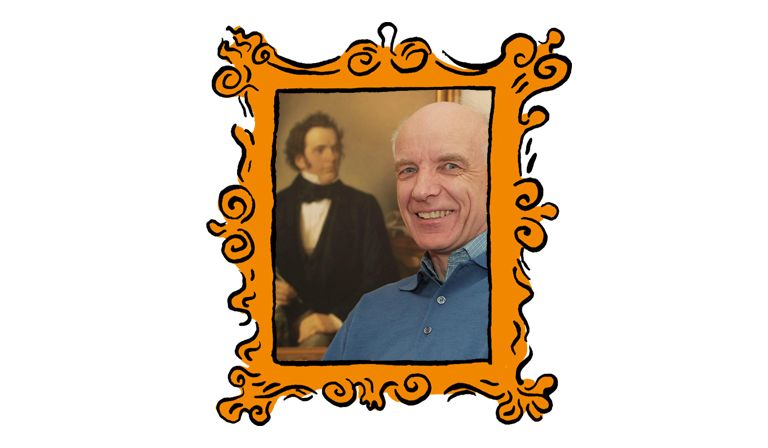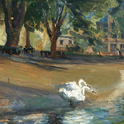Most festival directors would love to have Herr Nachbauer’s problems. For 50 years, he has presided over a glorious annual celebration of chamber music and song. The greatest musicians in the world flock to play. The audiences are happy to listen. What’s not to love?
The Schubertiade festival in the Bregenzerwald region of Austria is indeed a small oasis of wondrous music-making at a time when many sister festivals are struggling. The main venue opens onto lush green fields cradled in a semicircle of Alpine peaks. It receives no subsidy, and the director, Gerd Nachbauer, can reflect with enormous pride on his achievement of keeping such an endeavour on the road for half a century.
It’s difficult to think of any other festival director who has remained in one job for five decades. At the tender age of 22, Nauchbauer founded a Mozart festival in his hometown of Hohenems, in the westernmost part of Austria. By 1975, he had, with the German baritone Hermann Prey, morphed the idea into a festival devoted to Schubert.
Nachbauer became joint managing director in 1975. And here he is, 50 years later, perhaps quietly marvelling that he’s still running the show, which is now split between two sites: Hohenems and the busy, little working Alpine village of Schwarzenberg.
The formula changes little from year to year—and why should it? There’s a persuasive case to be made for continuity. Before the Covid-19 pandemic, the audience capacity in Schwarzenberg was around 95 per cent. Today, it’s around 85 per cent for the 600-seater Angelika Kaufmann Hall, still a figure that would please most classical music promoters around Europe.
However, there is some murmuring that the bold vision that Nachbauer and Prey had all those years ago is now, well, a little less bold. The Schubertiade has now, they argue, been preserved in aspic—and aspic works by forming a solid, airtight gelatin seal. “Let the oxygen back in!” some cry.
This year, I experienced something of a tonal shock at hearing the pianist Marc-André Hamelin play some 20th-century music! Admittedly, it was Nikolai Medtner and dated from 1914, but it was just the jolt my ears needed after two days of Schubert, Beethoven and Mozart.
It feels a little churlish to quibble after so many delights this year. At the end of a week of concerts, some wonderful high moments linger in the memory. Hearing Hamelin attack Rachmaninov (yes, another modern interloper!) with savage energy was one. Sabine Meyer’s silky-toned Mozart Clarinet Quintet was another.
Then there was the enthralled silence in the hall as the Belcea played Mozart’s Dissonance Quartet. The slow movement, in particular, held the audience in an almost hypnotic grip.
Next there was a Winterreise for the ages from the German-Romanian baritone Konstantin Krimmel, with Ammiel Bushakevitz on the piano. Krimmel has a wonderfully expressive range—at times almost a whisper, at others a howl of despair. He powerfully unfolds the narrative of the cycle but never spills over into being “operatic”. It was a masterclass in how to perform lieder.
On the final day, the veteran pianist, Elisabeth Leonskaja, nudging 80, enchanted—and, frankly, astonished—a packed house with the power of her playing in a massive Schubertian programme that included the Wanderer Fantasy, four impromptus and the late Piano Sonata in G Major, D 894. Plus two encores.
What a privilege to hear one of the last great Soviet-era pianists perform this music! The late Bernard Levin wrote about hearing Leonskaja’s mentor, Sviatoslav Richter, play at the Schubertiade in 1978. And here, 47 years later, is Leonskaya herself with pieces she’s played, lived with, thought about and worked on all her long life.
So there was much to admire and love last week as the Schubertiade gears up for its main celebrations next year. The best festivals educate, challenge and extend, as well as delight. There are, critics argue, surely ways of broadening the Schubertiade’s appeal without diluting its high-minded ethos?
A tiny suggestion to conclude: it’s slightly odd—for a festival with an international audience—that all the literature and programme notes are only available in German. In an age of AI, it would hardly be onerous to produce some English-language ones.
Indeed, it’s so easy, I had some fun generating different versions of programme notes for the Dissonance Quartet. Here’s a reasonable Martin Amis: “You don’t expect a joke like this from 1785. The opening bars unspool in a kind of deliberate wrongness—harmonic fog, clashing intervals, the sense that someone’s leaned on the piano with both forearms. It’s the sort of thing that would get you flung out of the court orchestra and maybe into debtor’s prison. But this is Mozart, and when he writes dissonance, it isn’t incompetence: it’s theatre. The grin in the title is half his, half ours, because the shock still works.”
Even better, here’s Irvine Welsh: “Right, so ye think ye ken Mozart? The powdered wig, the fancy courts, all that posh carry-on. Then he hits ye wi this quartet, an ye’re sittin there thinkin: what the hell’s goin oan here? The start’s pure mental. The instruments come in wan by wan, but instead o’ sittin nice an polite, they’re clashin, grindin, scrapin past each ither like folk too drunk tae find the door. The harmony’s awfy bent oot o’ shape, ye’re waitin for it tae settle, but it just keeps twistin the knife. That’s why they call it the Dissonance Quartet. Ye can feel the tension, like somebody’s aboot tae get chibbed in a dark close.”
If you can conjure up a passable pastiche of Amis and Welsh in a matter of seconds, would it be too much to ask someone to produce a basic English-language note for non-German speakers?
Enough frivolity. The Schubertiade continues to be a thing of wonder and Herr Nachbauer deserves a celebratory serenade for succeeding where so many other festivals have fallen by the wayside. But perhaps—perhaps!—a half-century is a good moment to begin a conversation about injecting a little innovation and energy in the spirit of Lampedusa’s The Leopard: “If we want things to stay as they are, things will have to change.”
Will the Schubertiade change?
This Austrian music festival has been going strong for decades. But a slight revamp may be needed if it’s to thrive for decades more
September 04, 2025













